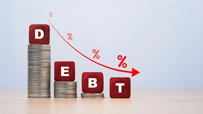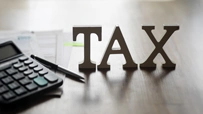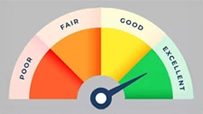ELSS or Tax-Saving Fixed Deposit (FD): Which One is More Suitable for You?
Disclaimer: Ujjivan Small Finance Bank does not offer Mutual Funds. This blog is written for generic information only.
September 03, 2025

In the vibrant streets of Mumbai, two close friends, Arjun and Ravi, were planning their financial future. Both were keen on saving taxes but were confused about choosing between Equity Linked Savings Schemes (ELSS) and Tax Saving Fixed Deposits (FDs). Arjun leaned towards the market-linked ELSS, enticed by its higher returns, while Ravi, valuing security and stability, found comfort in the assured returns of Tax Saving FDs. Their discussion reflects a common dilemma many investors face today.
Understanding ELSS and Tax Saving FDs
Both ELSS and Tax Saving FDs offer tax deductions under Section 80C of the Income Tax Act, allowing up to ₹1.5 lakh in deductions. However, they differ in risk, returns, lock-in periods, and tax treatment.
Tax Saving Fixed Deposits (FDs): Stability and Guaranteed Returns
- Nature of Investment: A secure, fixed-income product offered by banks with a lock-in period of 5 years.
- Returns: Interest rates are fixed throughout the tenure. The returns is calculated based on compound interest formula, where you earn interest not only on the principal amount but also on the accrued interest, thereby generating higher returns at the time of maturity.
- Market Effect: Fixed Deposits are not linked to the market, meaning your returns are unaffected by market conditions.
- Lock-in Period: 5 years with no premature withdrawals, promoting disciplined savings.
- Taxation: Interest is taxable according to the investor’s income tax slab. Also, TDS of 10% is applicable if the interest income exceeds ₹40,000 (₹50,000 for senior citizens) in a financial year. However, the principal investment qualifies for tax deduction under Section 80C. Please note that this TDS exemption on FD interest is applicable for FY 2024-25 (till March 2025). For FY 2025-26, the current TDS exemption limit has been hiked to ₹50,000 for regular citizens and ₹1 lakh for senior citizens.
- Maximum Investment: The maximum investment amount is ₹1.5 lakh in a financial year.
- Risk Factor: Virtually risk-free, making it ideal for conservative investors who prioritize capital protection.
Equity Linked Savings Scheme (ELSS): Potential for Higher Returns with Market Risk
- Nature of Investment: Primarily invests in equity markets, subject to market volatility.
- Returns: Historically higher returns, though not guaranteed.
- Market Effect: ELSS funds are market-linked products. The returns would vary based on market performance.
- Lock-in Period: 3 years, the shortest among tax-saving instruments.
- Taxation: There is no tax on gains up to ₹1,25 lakh. Long-term Capital Gains (LTCG) over ₹1.25 lakh will be taxed at 12.5%. Short-term Capital Gains (STCG) do not apply to ELSS because of the 3-year lock-in period stipulation.
- Risk Factor: High, as returns are market-dependent.
Why Tax Saving FDs Might Be a Better Choice
- Guaranteed Returns: Unlike ELSS, FDs offer fixed and predictable returns, shielding your savings from market volatility.
- Capital Protection: Perfect for risk-averse investors who prioritise the safety of their principal.
- Better for Short-Term Planning: The 5-year lock-in ensures disciplined savings while aligning with medium-term goals like home renovations or education expenses.
- Senior Citizen Advantage: Higher interest rates for senior citizens enhance returns without additional risk.
Making the Right Choice
Arjun's choice of ELSS suits his higher risk appetite, but Ravi's preference for Tax-Saving FDs offers him peace of mind with assured returns. For investors seeking stability, capital preservation, and disciplined saving, Tax Saving FDs emerge as a more reliable option.
Final Thoughts
Both ELSS and Tax-Saving FDs serve the purpose of tax saving under Section 80C, but their suitability depends on an individual's financial goals and risk tolerance. For those valuing stability and guaranteed growth, Tax-Saving FDs remain a trusted and prudent choice.
Looking to grow your savings faster? Ujjivan SFB offers a wide range of fixed deposit products. Select the FD of your choice and take a step forward to your financial goals. Alternatively, you can browse through Ujjivan SFB product suite - our wide range of financial products are designed to make your financial life better.
Disclaimer:
The contents herein are only for informational purposes and generic in nature. The content does not amount to an offer, invitation or solicitation of any kind to buy or sell, and are not intended to create any legal rights or obligations. This information is subject to updation, completion, amendment and verification without notice. The contents herein are also subject to other product-specific terms and conditions, as well as any applicable third-party terms and conditions, for which Ujjivan Small Finance Bank assumes no responsibility or liability.
Nothing contained herein is intended to constitute financial, investment, legal, tax, or any other professional advice or opinion. Please obtain professional advice before making investment or any other decisions. Any investment decisions that may be made by the you shall be at your own sole discretion, independent analysis and evaluation of the risks involved. The use of any information set out in this document is entirely at the user’s own risk. Ujjivan Small Finance Bank Limited makes no representation or warranty, express or implied, as to the accuracy and completeness for any information herein. The Bank disclaims any and all liability for any loss or damage (direct, indirect, consequential, or otherwise) incurred by you due to use of or due to investment, product application decisions made by you on the basis of the contents herein. While the information is prepared in good faith from sources deemed reliable (including public sources), the Bank disclaims any liability with respect to accuracy of information or any error or omission or any loss or damage incurred by anyone in reliance on the contents herein, in any manner whatsoever.
To know more about Ujjivan Small Finance Bank Products Visit:"https://www.ujjivansfb.in"
All intellectual property rights, including copyrights, trademarks, and other proprietary rights, pertaining to the content and materials displayed herein, belong
to Ujjivan Small Finance Bank Limited or its licensors. Unauthorised use or misuse of any intellectual property, or other content displayed herein is strictly prohibited and the same is not intended for distribution to, or use by, any person in any jurisdiction where such distribution or use would (by reason of that person’s nationality, residence or otherwise) be contrary to law or registration or would subject Ujjivan Small Finance Bank Limited or its affiliates to any licensing or registration requirements.
FAQs
1. Can I invest in both ELSS and Tax Saving FDs in the same financial year?
Yes, you can invest in both ELSS and Tax Saving FDs within the same financial year. However, the total amount you can claim as a deduction under Section 80C is limited to ₹1.5 lakh. Diversifying your investments across both instruments allows you to balance risk and stability in your tax-saving strategy.
2. Are the returns from Tax Saving FDs guaranteed?
Yes, Tax Saving FDs offer guaranteed and fixed returns, which are predetermined at the time of investment. This makes them an ideal choice for risk-averse investors seeking steady growth without exposure to market volatility.
3. Is the interest from Tax Saving FDs tax-free?
No, the interest earned from Tax Saving FDs is fully taxable as per your income tax slab. While the principal amount qualifies for tax deduction under Section 80C, the interest is added to your total income and taxed accordingly.
4. Which is better for conservative investors: ELSS or Tax Saving FDs?
For conservative investors who prioritise capital safety and predictable income, Tax Saving FDs are the better choice. They offer assured returns without the uncertainties of market-linked investments like ELSS.
5. Can I prematurely withdraw from a Tax Saving FD?
No, premature withdrawal from a Tax Saving FD is not allowed during its 5-year lock-in period. This feature encourages disciplined savings but requires careful financial planning to ensure liquidity.
6. Is there a SIP option available for Tax Saving FDs?
No, Systematic Investment Plans (SIPs) are not available for Tax Saving FDs. SIPs are designed for market-linked instruments like ELSS, allowing regular and flexible investments.
7. Which is more suitable for short-term goals?
Tax Saving FDs are better suited for medium-term financial goals due to their fixed tenure and assured returns. ELSS is more suitable for long-term wealth creation due to market volatility.
8. Are Tax Saving FDs safer than ELSS?
Yes, Tax Saving FDs are significantly safer than ELSS. Being bank-backed fixed-income instruments, FDs provide guaranteed returns and complete capital protection, unlike ELSS, which is exposed to equity market risks.
Latest Blogs

APK Fraud: How One Wrong Download Could Empty Your Bank Account
May 13, 2025
Picture this. You’re sipping your evening tea when your phone rings.

Gold Loan LTV Ratio Explained (75% to 85%): What It Means for Borrowers
March 20, 2025
In June 2025, the Reserve Bank of India (RBI) introduced a significant relaxation for gold loan borrowers: the maximum Loan-to-Value (LTV) ratio for loans below ₹2.5 lakh was raised to 85%, up from the long-standing cap of 75%. Loans between ₹2.5 lakh and ₹5 lakh can now go up to 80%, while loans above ₹5 lakh continue under the 75% ceiling.

Good Debt vs Bad Debt: Learn the Difference
August 13, 2025
Every month, millions of Indians wait for the familiar debit alert, an EMI deducted from their account.

Got a Tax Refund? 5 Smart Ways to Put Your 2025 Refund to Work
August 13, 2025
For many taxpayers, there’s a unique sense of relief when a tax refund arrives.

Credit Score Not Improving? 5 Mistakes You Might Be Making
August 13, 2025
For most of us, a credit score feels like a silent judge sitting in the background of our financial lives.





